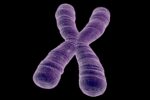Family History of Short Telomeres – Chromosome ‘Caps’ – Tied to PF Risk

People with a familial history of short telomere syndrome (STS) — a disorder involving shortened telomeres, or chromosome “caps” — may be at an increased risk of developing pulmonary fibrosis, even if they themselves do not have the mutation that causes STS, a new study highlights.
“This has consequences for genetic counselling of STS families,” the researchers wrote. “The risk for pulmonary fibrosis is still increased in non-mutation carrying first-degree relatives [parents, siblings, or children] and periodic clinical screening is highly recommended.”
The study, “Pulmonary fibrosis in non-mutation carriers of families with short telomere syndrome gene mutations,” was published in Respirology.
Telomeres are structures that cap the ends of chromosomes, helping to protect the DNA from damage. STS, as its name implies, is a condition characterized by abnormally short telomeres. It can lead to an increased risk of a variety of health problems, including bone marrow failure and accelerated aging syndromes.
Pulmonary fibrosis, or scarring in the lungs, is one of the more common manifestations of STS. Importantly, it is thought to directly result from abnormally short telomeres in cells.
The abnormally short telomeres in STS are caused primarily by mutations in genes associated with maintaining telomere health, such as the gene TERT. Plus, telomere length is somewhat heritable — in other words, a person with STS will generally have biological children who also have relatively short telomeres, regardless of whether or not each child inherits the SRT-causing mutation.
Thus, given that people with a family history of STS who do not carry STS-causing mutations tend to have shorter telomeres, and that shorter telomeres are directly tied to pulmonary fibrosis, it makes sense that these individuals may be at increased risk of developing pulmonary fibrosis.
However, there is scant data in this field — likely in part because people without a disease-causing mutation are generally not the focus of studies.
Now, researchers in the Netherlands conducted a screen of 99 unrelated families with histories of STS, looking for individuals who developed pulmonary fibrosis but did not have the STS-causing mutation. In keeping with prior data, all individuals in the affected families had shorter-than-normal telomeres, though those with the STS-causing mutation had significantly shorter telomeres than those without the mutation.
The team identified five people — three women and two men — with pulmonary fibrosis who were not carriers of the STS-causing mutation, from four unrelated families; two of the identified individuals were sisters.
All five had siblings and/or parents who were carriers of STS-causing mutations. Many of them also had other risk factors for pulmonary fibrosis. For instance, three of the five were former smokers. Additionally, three of the five — to include one of the former smokers — had other concurrent medical conditions. Their ages at the time of the study ranged from 60 to 84.
“In this study, we present cases with features of pulmonary fibrosis without carrying the [STS-causing] mutation that is present in their affected family members,” the researchers wrote.
“Disease development may be triggered by inherited short telomeres and additional risk factors for disease,” they wrote.
The team noted that this finding has “urgent” and “profound” consequences for genetic counseling among STS families, stressing that people with a familial history of STS should undergo routine monitoring for pulmonary fibrosis, even if they do not carry a STS-causing mutation.
This especially is important for individuals who have a parent, full sibling, or child — counted as a first-degree relative — with any short telomere syndrome, they said, noting that this study “reveals the complex nature of STS.”
“Unlike any other genetic syndrome, absence of the mutation does not imply absence of disease risk. Therefore, clinical follow-up is still urged for non-mutation carrying first-degree family members,” the researchers wrote.
The team also noted that it may be worthwhile to test for STS-causing mutations in all members of families affected by familial pulmonary fibrosis, even if one member of the family is found not to have such a mutation.
Limitations of this study, according to the researchers, include the small number of patients assessed and the short duration of follow-up. They also noted that there was not enough data to make meaningful comparisons between carriers and non-carriers of STS-causing mutations.
“More studies into the damaging effect of inheritance of short telomeres and the associated risk for disease are highly needed,” the team concluded.









